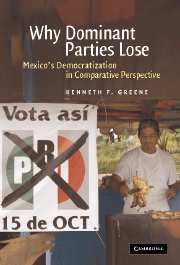Book contents
- Frontmatter
- Contents
- Figures and Tables
- Acknowledgments
- 1 The Puzzle of Single-Party Dominance
- PART 1 THE MACRO-PERSPECTIVE
- PART 2 THE MICRO-PERSPECTIVE
- PART 3 IMPLICATIONS
- 6 Constrained to the Core: Opposition Party Organizations, 1980s–1990s
- 7 Dominance Defeated: Voting Behavior in the 2000 Elections
- 8 Extending the Argument to Italy, Japan, Malaysia, and Taiwan
- 9 Conclusions and Implications
- References
- Index
7 - Dominance Defeated: Voting Behavior in the 2000 Elections
Published online by Cambridge University Press: 27 July 2009
- Frontmatter
- Contents
- Figures and Tables
- Acknowledgments
- 1 The Puzzle of Single-Party Dominance
- PART 1 THE MACRO-PERSPECTIVE
- PART 2 THE MICRO-PERSPECTIVE
- PART 3 IMPLICATIONS
- 6 Constrained to the Core: Opposition Party Organizations, 1980s–1990s
- 7 Dominance Defeated: Voting Behavior in the 2000 Elections
- 8 Extending the Argument to Italy, Japan, Malaysia, and Taiwan
- 9 Conclusions and Implications
- References
- Index
Summary
To this point, this book has been about how the PRI used its advantages to defeat challengers and maintain the dominant party equilibrium during most of the 20th century. Even as free market economic restructuring progressively deprived the PRI of these advantages, dominance persisted because the dynamics of opposition party building created two key coordination problems for the challengers. First, the pattern of political recruitment yielded generational conflicts over strategy inside the opposition parties between relatively policy-extreme early joiners and more moderate later joiners. Second, since the PRI's advantages expelled challengers to the left and the right on economic policy issues, there were strong incentives not to coordinate their efforts against the incumbent even though they both wanted to defeat the PRI and transform Mexico into a fully competitive democracy.
Yet despite these problems, the PRI was eventually defeated. In the 2000 elections, Vicente Fox of the PAN won the presidency and became the first president to peacefully receive power from a political rival in Mexico's history. Why was an opposition party able to win in 2000 and why was that party the PAN instead of the PRD? This latter question is particularly intriguing because the austere economic conditions that turned voters away from the PRI resulted in part from the government's adoption of free market economic policies. At a time when left and center-left candidates began to win power in several Latin American countries, one might have expected the leftwing PRD to be in a better position than the rightwing PAN. Why did it turn out the other way around?
- Type
- Chapter
- Information
- Why Dominant Parties LoseMexico's Democratization in Comparative Perspective, pp. 210 - 254Publisher: Cambridge University PressPrint publication year: 2007



